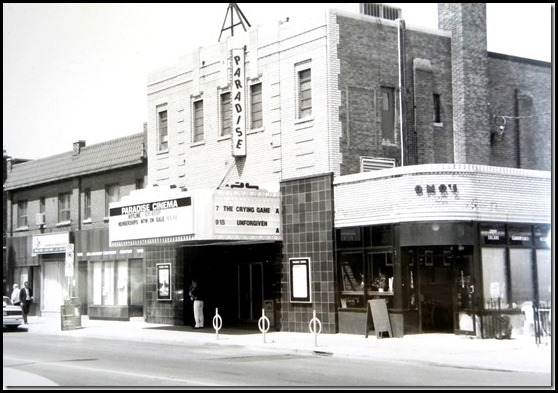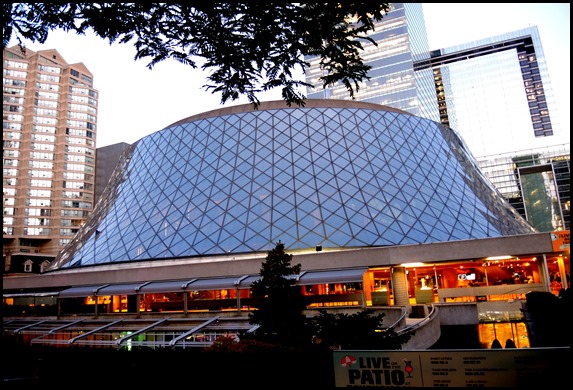Mayfair Theatre, City of Toronto Archives, Series 1278, Fl. 108 SC 488-3200
The Mayfair Theatre at 347 Jane Street opened in September, 1927. It was located on the east side of the street, a short distance south of Annette Street. When it opened, it was in a remote suburban community, to the northwest of the downtown area. The theatre mostly attracted people from the surrounding community, as there was no TTC service. The Mayfair was relatively modest in size, containing 478 seats, the centre section having eight seats, with five seats on either side. There was no balcony. The air-conditioning was filtered water-washed air.
In 1942, the Roseland Bus Line commenced service in the area. The bus route began at the Junction (Dundas and Keele Streets). The buses travelled north on Keele to St. Clair, which was where Keele Street changes its name to Weston Road. On Weston Road, it continued northward as far as Lambton Avenue. Here, it turned west to Jane Street. It continued southbound on Jane Street to Annette Street, where it terminated. Where the Roseland buses turned around, was where the Mayfair Theatre was located. This was advantageous for the theatre, since it was easier to reach by public transit.
My family moved into the Roseland area (near Jane Street and Lambton Avenue) in 1954. We often travelled on the Roseland Bus Line. In this year, if we journeyed south on the bus line to Annette Street, there was the Annette trolley bus that connected with the bus to continue our journey to Bloor Street. Thus, during the 1950s, the Mayfair Theatre was near two public transportation lines. The Roseland Bus Line ceased operating when the TTC extended its service into the area.
The Roseland buses in 1955. Photo from the Toronto Reference Library, Baldwin Room, S-1-512
An Annette trolley bus from the 1950s. Photo from chuckmantorontonostalgia.wordpress
In the 1950s, I attended Runnymede Collegiate on Jane Street, a ten minute walk north of the Mayfair Theatre. I seem to recall that the theatre was named the Annette in those years, but I have been unable to locate any information to substantiate this memory. Many of the students at Runnymede regularly attended the theatre, and the favourite place for a cup of coffee or milkshake after the movie was the Dairy Dell. It was around the corner from the theatre, on Annette Street. It had the reputation of being a “teenage hang-out.”
The theatre closed in April 1959 and the building was placed on the real estate market at the price of $48,000. It was eventually purchased and converted for other retail purposes.
The Mayfair Theatre in 1928, the year after it opened. The view gazes south on Jane Street from near Annette Street. The houses on the opposite side of Jane Street (west side), remain there today (2014). In the above photo, there is a vacant building lot on the north side of the theatre. Empty building lots are also visible further down the street, on the west side. Photo from City of Toronto Archives, Series 1278, FL. 108, SC 488-3200.
Architects plans for the Mayfair, showing the west facade and a side view of the theatre. Photo from the City of Toronto Archives.
The site on Jane Street where the Mayfair Theatre was located. City of Toronto Archives.
To view the Home Page for this blog: https://tayloronhistory.com/
To view previous blogs about other movie houses of Toronto—old and new
https://tayloronhistory.com/2013/10/09/links-to-toronto-old-movie-housestayloronhistory-com/
To view links to other posts placed on this blog about the history of Toronto and its buildings:
https://tayloronhistory.com/2013/10/08/links-to-historic-architecture-of-torontotayloronhistory-com/
Recent publication entitled “Toronto’s Theatres and the Golden Age of the Silver Screen,” by the author of this blog. The publication explores 50 of Toronto’s old theatres and contains over 80 archival photographs of the facades, marquees and interiors of the theatres. It also relates anecdotes and stories from those who experienced these grand old movie houses.
To place an order for this book:
Theatres Included in the Book:
Chapter One – The Early Years—Nickelodeons and the First Theatres in Toronto
Theatorium (Red Mill) Theatre—Toronto’s First Movie Experience and First Permanent Movie Theatre, Auditorium (Avenue, PIckford), Colonial Theatre (the Bay), thePhotodome, Revue Theatre, Picture Palace (Royal George), Big Nickel (National, Rio), Madison Theatre (Midtown, Capri, Eden, Bloor Cinema, Bloor Street Hot Docs), Theatre Without a Name (Pastime, Prince Edward, Fox)
Chapter Two – The Great Movie Palaces – The End of the Nickelodeons
Loew’s Yonge Street (Elgin/Winter Garden), Shea’s Hippodrome, The Allen (Tivoli), Pantages (Imperial, Imperial Six, Ed Mirvish), Loew’s Uptown
Chapter Three – Smaller Theatres in the pre-1920s and 1920s
Oakwood, Broadway, Carlton on Parliament Street, Victory on Yonge Street (Embassy, Astor, Showcase, Federal, New Yorker, Panasonic), Allan’s Danforth (Century, Titania, Music Hall), Parkdale, Alhambra (Baronet, Eve), St. Clair, Standard (Strand, Victory, Golden Harvest), Palace, Bedford (Park), Hudson (Mount Pleasant), Belsize (Crest, Regent), Runnymede
Chapter Four – Theatres During the 1930s, the Great Depression
Grant ,Hollywood, Oriole (Cinema, International Cinema), Eglinton, Casino, Radio City, Paramount, Scarboro, Paradise (Eve’s Paradise), State (Bloordale), Colony, Bellevue (Lux, Elektra, Lido), Kingsway, Pylon (Royal, Golden Princess), Metro
Chapter Five – Theatres in the 1940s – The Second World War and the Post-War Years
University, Odeon Fairlawn, Vaughan, Odeon Danforth, Glendale, Odeon Hyland, Nortown, Willow, Downtown, Odeon Carlton, Donlands, Biltmore, Odeon Humber, Town Cinema
Chapter Six – The 1950s Theatres
Savoy (Coronet), Westwood
Chapter Seven – Cineplex and Multi-screen Complexes
Cineplex Eaton Centre, Cineplex Odeon Varsity, Scotiabank Cineplex, Dundas Square Cineplex, The Bell Lightbox (TIFF)


![photo-toronto-ttc-electric-trolley-bus-annette-street-route-1950s[1] photo-toronto-ttc-electric-trolley-bus-annette-street-route-1950s[1]](https://tayloronhistory.files.wordpress.com/2014/01/photo-toronto-ttc-electric-trolley-bus-annette-street-route-1950s1_thumb.jpg)






Thanks a lot for sharing a great Blog. i like your work
I went to the Mayfair theatre in the 1950’s seeing Lassie movies, also loved the Dairy Dell and Nifty Nook fish and chips where we got it at least once a week. I also attended King George Public School on St. John’s Rd. Lived on Willard Ave until 1966 whe I moved to Vancouver. I also went to Runnymede Collegiate and graduated in 1968.
I spent every Saturday afternoon at the Mayfair Theatre in the 1950’s.
I attended King George Public School for one year only (Kindergarten).
After we moved to Baby Point District (Valleyview Gardens), I attended Humbercrest Public School up to Grade 8.